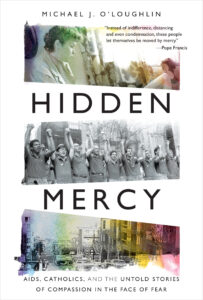
In Hidden Mercy: AIDS, Catholics, and the Untold Stories of Compassion in the Face of Fear (Broadleaf Books, 2021) journalist Michael O’Loughlin explores the early years of the AIDS epidemic through the stories of “quiet heroes” who “didn’t look away, who at great personal cost” (book flyleaf) chose to respond with compassion to those suffering from a virulent and frightening disease whose cause and course was not immediately known.
O’Loughlin devotes an entire chapter to some of those quiet heroes who served at St. Vincent’s Medical Center, Manhattan. It was Ground Zero for AIDS cases in the 1980’s and ‘90’s. When the author visited the contemporary AIDS memorial across from the site of the former hospital (which closed in 2010), he asked a local historian about the sisters who ran the hospital. The man replied, ”The only people to stay behind and take care of the dying and the sick were the Sisters of Charity, following their Christian mission.”
In one of the book’s chapters, the author recounts the story of “what would become one of the finest AIDS clinics anywhere in the United States” and describes the “culture of holistic care [that] made it special. The hospital tried to celebrate life even in the midst of unrelenting death.”
He gives special mention to Dr. Ramon (Gabriel) Torres and to Sr. Patrice Murphy, SC, then coordinator of St. Vincent’s supportive care program, whose smart, sensitive and dedicated presence was legendary. Thirty years later when O’Loughlin was researching the book, Sr. Patrice was too ill to be interviewed. Yet the many who were touched by her presence described her as one who “found joy” in her work that inspired others.
Sr. Karen Helfenstein, SC, (who currently serves as Director of Sponsorship Services for the Sisters of Charity) features prominently in another chapter. In the late 1980’s, Sr. Karen was vice president for mission at St. Vincent’s. Though HIV-AIDS continued to spread, response by some governmental and religious agencies was slow, and public protests by activists grew more confrontational. When one such protest targeted St. Vincent’s, Sr. Karen was tasked with coordinating the response. After many heated internal discussions, the hospital chose to meet with the protesters and listen to their grievances instead of bringing charges against them. Ultimately (though not without pain) this approach helped to defuse tensions and lead to deeper mutual understanding.
Dr. Christopher Mills, a former and well-loved surgeon at St. Vincent’s and trustee of the Sisters of Charity Ministry Network, is quoted by the author, who interviewed Dr. Mills — just a few weeks before his death, as it turned out – about the culture of the hospital in the 1990’s. Also acknowledged for her assistance is Elena Miranda, Director of Communications for the Sisters of Charity of New York.
O’Loughlin sent a letter about his book to Pope Francis who wrote back, “Thank you for shining a light on the lives and bearing witness to the many priests, religious sisters and lay people, who opted to accompany, support and help their brothers and sisters who were sick from H.I.V. and AIDS at great risk to their profession and reputation.”
– Sr. Regina Bechtle

I was a team member working with AIDS PATIENTS at SV Hospital back in 1980’s on Spellman unit in Manhattan NY.
I was privileged to have been on this specialized nursing team of professionals.